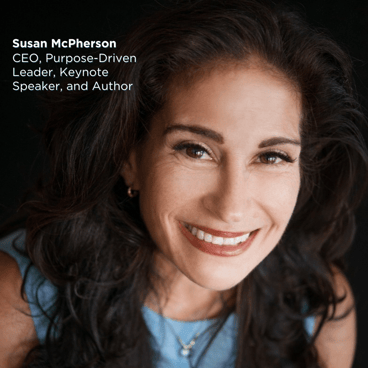 This week, Luminary Reflections spoke with CEO and Founder of McPherson Strategies, Susan McPherson. Susan is also the author of the 2021 book The Lost Art of Connecting: The Gather, Ask, Do Method for Building Meaningful Business Relationships. Susan grew up with parents who were always reaching out and making connections. They would clip the newspapers and send them along to anyone on their mind. She has made a career out of her expertise in connections.
This week, Luminary Reflections spoke with CEO and Founder of McPherson Strategies, Susan McPherson. Susan is also the author of the 2021 book The Lost Art of Connecting: The Gather, Ask, Do Method for Building Meaningful Business Relationships. Susan grew up with parents who were always reaching out and making connections. They would clip the newspapers and send them along to anyone on their mind. She has made a career out of her expertise in connections.
Read our newest interview and read how Susan talks about the importance of networking and perhaps most importantly, connecting.
LUMINARY REFLECTIONS: Your bio describes you as a “serial connector” and an “expert in communications.” Please talk a bit about what that means.
SUSAN MCPHERSON: For the last ten years, I have run an impact communications firm [McPherson Strategies] where we help organizations, companies, NGOs, foundations, etc. on how they communicate their impact. But if you peel back the layers, it’s all about connections; connections with funders, sponsors, with investors, with customers, with clients. So, being able to understand how to build connections is what drives everything.
When I was a kid, my parents used the technology of the time–manual typewriters, the US Postal Mail, and the rotary telephone–to do what we do today. I loved watching them and I mirrored them. As soon as we had the internet, social media, cell phones and smart phones, I was able to do what they did much more efficiently. My book [The Lost Art of Connecting: The Gather, Ask, Do Method for Building Meaningful Business Relationships] is about finding the intentionality that [my parents] had. How do we not become transactional when the tools make it so easy? Without the intentionality we move from connecting to networking.
LR: What is the difference between connecting and networking?
SM: Networking is, by nature of what it is, transactional. And I’m not suggesting anything’s wrong with that. We all need to network. But, if we want to build deeper, more meaningful relationships that span the test of time, it is more about reciprocity and leading with how you can be helpful.
LR: Your book has a method in order to accomplish that: “The Gather, Ask, Do.” Please describe them.
SM: The Gather phase is first and foremost about connecting with the most important person in your life, and that is yourself. This phase involves thinking about what your superpowers and strengths are. Assess what it is that you bring to the table. It’s not about having a million dollars or a PhD in Chemistry. Your superpowers can be things like being really good at directions or making a tremendous spaghetti sauce. The most important thing is assessing how you can be of help. Also, you must think about people with whom you want to connect or reconnect; people that you can support, but also, who can support you. We must also think about the challenging, but necessary, road map to breaking out of our hermetically sealed bubbles–where we attract people that look like us, sound like us, are the same age/race/color as us.
Then, the Ask phase is all about asking meaningful questions of others, so we can learn what their hopes, dreams, and desires are. And if we listen [to their answers] very carefully, we can go to the Do phase, which is my favorite phase, and I know it’s Cate Luzio’s favorite phase. That’s when we take what we learned from listening and we follow up and follow through; we become reliable, responsible and trustworthy, which leads to long, healthy, meaningful relationships.
LR: Why is networking is important in our current landscape?
SM: Well, it’s important in any landscape! It was important 30 years ago when I first started. In the end, if you think about everything good that’s ever happened in your life, almost all of it happened because of someone you met. Personal relationships, professional relationships, your jobs, the clubs you join, your non-profits, your board seats–it all happened because you had a conversation or were introduced to someone. Networking helps us get there, but it’s the building of those relationships that help those connections go to the next level.
I also think that given the fact that for the last two years we have not been able to get out and about much, there is more pressure to get out a little bit more. But, for people who are shy or introverted, networking is terrifying; and I’m sure in some ways connecting is too. But the beautiful thing about connecting is it’s 1:1.
LR: What advice do you have for someone who may feel they’re too low in rank to effectively enter into a conversation with a “superior” who is more experienced?
SM: This is where the Gather phase is really valuable, because you can find out that even though someone may rank higher, you may have a superpower that they’ve never had. Maybe you can speak multiple languages, maybe you’ve lived abroad and they’re getting ready to go abroad, maybe you’re a phenomenal chef. We assume these hierarchies exist, but they’re man-made. I’m not suggesting it’s not scary. But if you do this exercise before you go into these conversations and, perhaps, ask some of your closest friends or family members, “What are my superpowers?”, then, you can lead with that; rather than walking into a room only thinking about how these people can help you–even though inevitably, that’s what you want. I fervently believe that when you help others, the help comes back. It may not happen today or tomorrow, but it will.
The other thing to think about is we’ve all experienced this global pandemic. It’s the first time in recent history that everyone everywhere experienced something. So, it’s leveled the playing field; it’s something we all share. You didn’t escape this no matter where you were. So, if you think you don’t have the privilege to be in a room, you absolutely do.
LR: What is something in The Lost Art of Connecting: The Gather, Ask, Do Method for Building Meaningful Business Relationships that would surprise a reader?
SM: If you decide that you want to invest in building meaningful connections over the course of your lifetime, you’ll live longer and you’ll be healthier. It’s the equivalent to eating kale everyday or running everyday; it makes for a richer and better life.






Comments